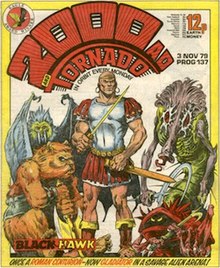Blackhawk (Tornado)
| Blackhawk | |
|---|---|
 |
|
| Character information | |
| First appearance | Tornado #4 (April 1979) |
| Publication information | |
| Publisher | IPC Magazines |
| Schedule | Weekly |
| Formats | Original material for the series has been published as a strip in the comics anthology(s) Tornado and 2000 AD. |
| Genre | |
| Creative team | |
| Writer(s) |
Tornado Gerry Finley-Day 2000 AD Alan Grant/Kelvin Gosnell as "Alvin Gaunt" |
| Artist(s) |
Tornado Alfonso Azpiri 2000 AD Massimo Belardinelli Ramon Sola Joe Staton Greg Guler |
| Reprints | |
| Collected editions | |
| Blackhawk | ISBN |
Blackhawk was a comic strip appearing on the British magazine Tornado, created by Gerry Finley-Day. It was one of three strips to transfer from Tornado to 2000 AD after the two merged.
At the time of the Roman Empire a Nubian slave rises up against his captors and leads a rebellion. However his bravery is recognised by a Roman General and he is commissioned as a Roman Centurion. Blackhawk took his name from a Hawk that he adopted and assembled a crack platoon from hardened prisoners and other slaves. As with other Finley-Day war stories the basic plot was borrowed from The Dirty Dozen with Blackhawk's squad being singled out for the hardest missions.
In 2000 AD he is taken from his Roman captors by an alien species only to be entered into their own intergalactic gladiatorial events against other alien species. Blackhawk adopts a Wookiee type alien as a sidekick (ironically the Hawk that gave him his name was left behind on earth). Blackhawk manages to escape but ends up stranded on a planet orbiting a black hole. Here a creature called "The SoulSucker" removes Blackhawks soul and he pursues the SoulSucker relentlessly, eventually regaining it shortly before the end of the series run.
Eventually, Tharg the Mighty's race were written in, and the whole cast were sucked into a black hole. They are later seen in Tharg's desk drawer, where Blackhawk complains how long they have been waiting as Ace Garp is selected for a revival.
In the 2000 AD Yearbook 1994 it was acknowledged by the editor that this was a poor series, and Alan Grant wrote himself into a corner.
All the stories are collected in one trade paperback:
...
Wikipedia
